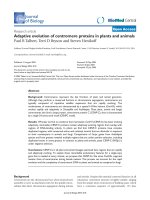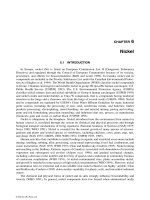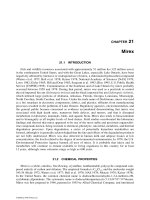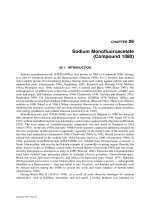2.3 How plants and animals live together (life science)
Bạn đang xem bản rút gọn của tài liệu. Xem và tải ngay bản đầy đủ của tài liệu tại đây (6.92 MB, 14 trang )
Life Science
Genre
Nonfiction
Comprehension Skill
Cause and Effect
Text Features
• Diagrams
• Glossary
Science Content
Ecosystems
Scott Foresman Science 2.3
ISBN-13: 978-0-328-34216-7
ISBN-13:
978-0-328-34216-7
ISBN-10:
ISBN-10:
0-328-34216-5
0-328-34216-5
9 0
9
0 0
0 0
0 0
0
9
9
78
7
80
03
32
28
8 3
34
42
21
16
67
7
by May Evans
Vocabulary
consumer
What
did you
learn?
How
Plants
and
1.
Animals
What do plants and animals need?
Live Together
food chain
2. What is a predator?
food web
3.
each other safe. Write to explain how this
happens. Use words from the book as you
write.
predator
prey
producer
Photographs: Every effort has been made to secure permission and provide appropriate credit for
photographic material. The publisher deeply regrets any omission and pledges to correct errors called to its
attention in subsequent editions. Unless otherwise acknowledged, all photographs are the property of Scott
Foresman, a division of Pearson Education. Photo locators denoted as follows: Top (T), Center (C), Bottom
(B), Left (L), Right (R) Background (Bkgd)
Opener: (Bkgd) ©Nigel J. Dennis/NHPA Limited, (TR) ©Photodisc Blue/Getty Images; Title Page: ©Peter
Johnson/Corbis; 2 ©Clem Haagner/Gallo Images/Corbis; 3 ©Steve Bein/Corbis, (CC) ©Nigel J. Dennis/
NHPA Limited; 4 ©Ian Beames/Ecoscene/Corbis; 6 (BL) ©Royalty-Free/Corbis, (BR) ©Joe McDonald/
Corbis; 7 (CR) ©William Bernard/Corbis, (BL) ©Gail Shumway/Getty Images; 8 (CC) ©Royalty-Free/
Corbis, (TR) ©DK Images, (CR) ©Joe McDonald/Corbis, (BR) ©Stephen Krasemann/NHPA Limited;
9 (CC) ©Jim Zipp/Photo Researchers, Inc., (CR) © Royalty-Free/Corbis, (BL) ©Gail Shumway/Getty
Images; 10 (CL) ©Randy Morse/Animals Animals/Earth Scenes, (BC) ©Stephen Frink/Corbis, (CR)
©Andrew J. Martinez/Photo Researchers, Inc.; 11 ©Kennan Ward/Corbis; 12 (CR) ©Randy Morse/
Animals Animals/Earth Scenes, (TC) ©James Watt/Animals Animals/Earth Scenes, (CR) ©Stephen Frink/
Corbis, (BC) ©Steve Bein/Corbis; 13 (CL) ©Andrew J. Martinez/Photo Researchers, Inc., (TR) ©Amos
Nachoum/Corbis, (CR) ©Kennan Ward/Corbis; 14 ©Sanford/Agliolo/Corbis; 15 ©Bettmann/Corbis;
16 ©Fred McConnaughey/Photo Researchers, Inc.; 17 ©Michael and Patricia Fogden/Corbis; 18 (BL)
©Farrell Grehan/Corbis, (CL) ©Photodisc Green/Getty Images, (TR) ©Darrell Gulin/Corbis; 19 ©DK
Images; 20 ©Richard Murphy; 21 ©Eric and David Hosking/Corbis; 22 ©Pete Atkinson/NHPA Limited.
ISBN 13: 978-0-328-34216-7; ISBN 10: 0-328-34216-5
Copyright © Pearson Education, Inc.
All Rights Reserved. Printed in the United States of America. This publication is
protected by Copyright and permission should be obtained from the publisher prior
to any prohibited reproduction, storage in a retrieval system, or transmission in any
form by any means, electronic, mechanical, photocopying, recording, or likewise. For
information regarding permissions, write to: Permissions Department, Scott Foresman,
1900 East Lake Avenue, Glenview, Illinois 60025.
1 2 3 4 5 6 7 8 9 10 V010 13 12 11 10 09 08 07
by MaySometimes
Evans animals keep
4.
Cause and Effect What can cause
changes to a food web? What effect did the
oil spill have on the sea otters on page 15?
What do plants and
animals need?
Plants are living things.
Plants need air and water.
Plants need light from the Sun.
Plants need space.
Animals are living things too.
Animals need air and water.
Animals need shelter.
Animals need space.
Animals are consumers.
A consumer cannot make its own food.
A consumer gets food from its habitat.
Plants are producers.
A producer makes its own food.
2
3
Different Needs
Plants and animals live together.
Plants and animals need each other.
Plants and animals get what they need from
the places they live.
4
Big animals need a lot of food and space.
Small animals need less food and space.
If there is not enough food and space, some
animals may die.
5
How do plants and animals
get food in a grassland?
All food chains have predators.
A predator hunts and eats other animals.
Most plants make food.
Some animals eat plants for food.
Other animals eat these animals.
This is a food chain.
All food chains have prey.
Predators eat prey.
Prey is the food of predators.
All food chains start with the Sun.
Plants get energy from the Sun.
Plants use energy to make food.
Corn
6
Animals eat the plants and other animals.
Energy goes from the Sun to the animals.
Vole
Coyote
Mountain lion
7
Food Web in a Grassland
Places can have more than one food chain.
A food web is many food chains in
one place.
A grassland has many food chains.
They make up a food web.
Look at the arrows in this food web.
How many animals eat corn?
How many animals eat voles?
Living things in a food web need each other
for energy.
Hawk
Raccoon
Corn
Vole
Coyote
Mountain lion
Fox
8
9
How do plants and animals
get food in an ocean?
An ocean has food chains and food webs.
Kelp starts an ocean food chain.
Kelp grows in the ocean.
It uses light from the Sun to make food.
The sea urchin gets energy when it eats
the kelp.
The sea star gets energy when it eats the
sea urchin.
Energy from the Sun goes to all the plants
and animals in the ocean.
Sea otter
Sea star
Kelp
Sea urchin
10
11
A Food Web in an Ocean
There are many food chains in an ocean.
They make up ocean food webs.
Look at this picture of an ocean food web.
Which animals eat kelp?
How many animals eat sea urchins?
Kelp crab
Orca
Sea urchin
Sea otter
Kelp
Sea gull
Sea star
12
13
What can cause a food web
to change?
Many things can change a food web.
Changes can hurt plants and animals.
Some changes are caused by people.
The oil from a ship spilled into the ocean.
14
Look at these sea otters.
Sea otters have fur.
The sea otters’ fur was hurt by the oil.
People cleaned the sea otters.
They also cleaned the water.
People made the ocean safe again.
15
How do plants and animals
help each other?
Plants and animals can help each other.
Animals can use plants for shelter.
The animals can help the plants too.
Cardinal fish live near sea urchins.
The sea urchin’s spines stop other animals
from eating the fish.
Cardinal fish do not help or hurt the
sea urchins.
An ant makes its home on an acacia plant.
The ant helps the plant stay safe.
It bites any animal that tries to eat the plant.
16
17
Building Nests
Some animals use plant parts to make nests.
Some animals use animal parts to
make nests.
18
This squirrel’s nest has twigs and leaves on
the outside.
The twigs and leaves come from plants.
This nest has feathers and wool on
the inside.
The feathers and wool come from animals.
19
Animals Need Each Other
Sometimes animals help each other get food.
Sometimes animals keep other animals safe.
This bird eats bugs that might hurt the rhino.
20
This boxer crab can stay safe near
a sea anemone.
A sea anemone is an animal.
The sea anemone can sting predators that
want to get the boxer crab.
21
A remora fish swims with a shark.
The shark keeps the remora fish safe.
It scares away predators.
The remora fish needs the shark.
The shark does not hurt the remora fish.
22
Plants and animals live together in
their habitats.
They need each other in many
different ways.
23
Vocabulary
Glossary
consumer
consumer
food chain
food web
food
chain
predator
prey
food web
producer
What did you learn?
an animal that cannot make
its own food but gets it from its
habitat
2. What is a predator?
3.
Sometimes animals keep
each other safe. Write to explain how this
happens. Use words from the book as you
write.
4.
Cause and Effect What can cause
changes to a food web? What effect did the
oil spill have on the sea otters on page 15?
how energy flows from the Sun to
plants to animals in a habitat
many food chains in one place
predator
an animal that hunts and eats
other animals
prey
an animal that gets eaten by other
animals
producer
a living thing that makes its own
food
Photographs: Every effort has been made to secure permission and provide appropriate credit for
photographic material. The publisher deeply regrets any omission and pledges to correct errors called to its
attention in subsequent editions. Unless otherwise acknowledged, all photographs are the property of Scott
Foresman, a division of Pearson Education. Photo locators denoted as follows: Top (T), Center (C), Bottom
(B), Left (L), Right (R) Background (Bkgd)
Opener: (Bkgd) ©Nigel J. Dennis/NHPA Limited, (TR) ©Photodisc Blue/Getty Images; Title Page: ©Peter
Johnson/Corbis; 2 ©Clem Haagner/Gallo Images/Corbis; 3 ©Steve Bein/Corbis, (CC) ©Nigel J. Dennis/
NHPA Limited; 4 ©Ian Beames/Ecoscene/Corbis; 6 (BL) ©Royalty-Free/Corbis, (BR) ©Joe McDonald/
Corbis; 7 (CR) ©William Bernard/Corbis, (BL) ©Gail Shumway/Getty Images; 8 (CC) ©Royalty-Free/
Corbis, (TR) ©DK Images, (CR) ©Joe McDonald/Corbis, (BR) ©Stephen Krasemann/NHPA Limited;
9 (CC) ©Jim Zipp/Photo Researchers, Inc., (CR) © Royalty-Free/Corbis, (BL) ©Gail Shumway/Getty
Images; 10 (CL) ©Randy Morse/Animals Animals/Earth Scenes, (BC) ©Stephen Frink/Corbis, (CR)
©Andrew J. Martinez/Photo Researchers, Inc.; 11 ©Kennan Ward/Corbis; 12 (CR) ©Randy Morse/
Animals Animals/Earth Scenes, (TC) ©James Watt/Animals Animals/Earth Scenes, (CR) ©Stephen Frink/
Corbis, (BC) ©Steve Bein/Corbis; 13 (CL) ©Andrew J. Martinez/Photo Researchers, Inc., (TR) ©Amos
Nachoum/Corbis, (CR) ©Kennan Ward/Corbis; 14 ©Sanford/Agliolo/Corbis; 15 ©Bettmann/Corbis;
16 ©Fred McConnaughey/Photo Researchers, Inc.; 17 ©Michael and Patricia Fogden/Corbis; 18 (BL)
©Farrell Grehan/Corbis, (CL) ©Photodisc Green/Getty Images, (TR) ©Darrell Gulin/Corbis; 19 ©DK
Images; 20 ©Richard Murphy; 21 ©Eric and David Hosking/Corbis; 22 ©Pete Atkinson/NHPA Limited.
ISBN 13: 978-0-328-34216-7; ISBN 10: 0-328-34216-5
Copyright © Pearson Education, Inc.
All Rights Reserved. Printed in the United States of America. This publication is
protected by Copyright and permission should be obtained from the publisher prior
to any prohibited reproduction, storage in a retrieval system, or transmission in any
form by any means, electronic, mechanical, photocopying, recording, or likewise. For
information regarding permissions, write to: Permissions Department, Scott Foresman,
1900 East Lake Avenue, Glenview, Illinois 60025.
1 2 3 4 5 6 7 8 9 10 V010 13 12 11 10 09 08 07
24
1. What do plants and animals need?









